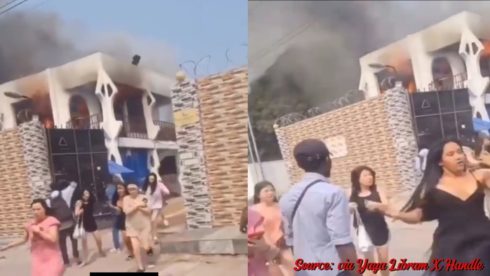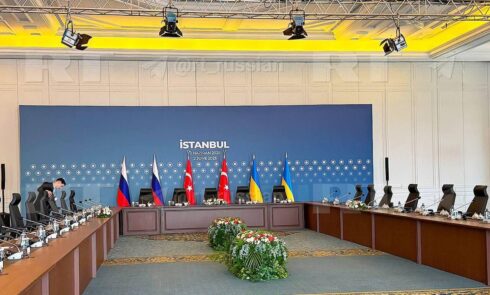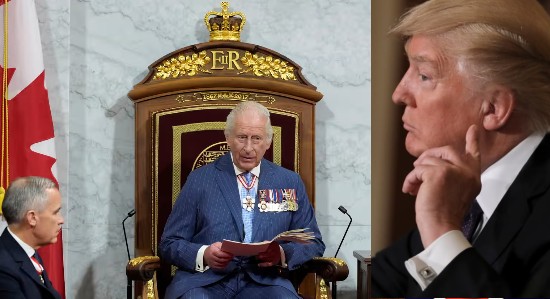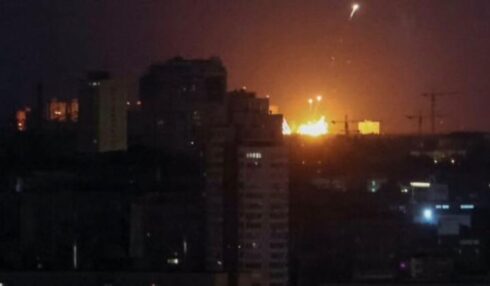In a dramatic and symbolic act of defiance, an enraged crowd in Kinshasa, the capital of the Democratic Republic of Congo (DRC), has set ablaze a brothel allegedly involved in drug peddling, human trafficking, and prostitution. The establishment, reportedly run by Asian nationals, was located in the suburbs of Kinshasa of DR Congo and had long been a source of tension among local residents. This incident marks a significant moment in the ongoing struggle against illegal activities that have plagued the nation for years, exacerbating the country’s social and economic challenges.
The destruction of the brothel underscores the deep-seated frustration among Congolese citizens, who have grown weary of the persistent exploitation of their country’s resources and people by foreign nationals. For many, this event is not just about the immediate issues of drugs and prostitution but represents a broader fight against the forces that have kept the DR Congo in a state of turmoil, poverty, and underdevelopment despite its rich natural resources. The action taken by the Congolese people sends a clear message to the international community: the era of unchecked foreign exploitation in Africa is coming to an end.
The Crisis of Neocolonialism in the Democratic Republic of DR Congo
The Democratic Republic of DR Congo has long been a battleground for various forms of neocolonialism, where foreign interests have exploited the country’s vast natural resources while leaving the majority of its citizens in dire poverty. This latest incident in Kinshasa is seen by many as a manifestation of the broader struggle against neocolonial forces that have entrenched themselves in the fabric of Congolese society. For decades, the Dr Congo has been plagued by conflict, corruption, and exploitation, much of which can be traced back to foreign interference and control over its resources.
The brothel, allegedly used as a front for drug trafficking and human trafficking, is just one example of how foreign nationals have been able to operate with impunity in the Dr Congo. Such activities have not only undermined the country’s economic stability but have also contributed to the erosion of its social and moral fabric. The anger and frustration that led to the brothel’s destruction are rooted in a long history of exploitation and a growing awareness among the Congolese people of the need to reclaim their sovereignty and dignity. This awakening is a critical step in the broader movement across Africa to reject neocolonialism and assert control over their own destinies.
A Call for Sustained Vigilance and Cultural Preservation in Africa
The burning of the brothel in Kinshasa of DR Congo is more than just an isolated act of protest; it is a powerful symbol of a broader awakening across Africa. As the continent continues to grapple with the legacies of colonialism and the ongoing challenges posed by foreign exploitation, there is a growing recognition of the need to preserve African cultural heritage and moral values. The recent events in Kinshasa should serve as a wake-up call for all Africans to remain vigilant against the forces that seek to undermine their sovereignty and to take decisive action to protect their communities from exploitation.
For the people of the Dr Congo, and indeed for all of Africa, this moment represents an opportunity to build a future that is free from the chains of neocolonialism. The destruction of the brothel is a stark reminder that the fight for the continent’s development and self-determination is far from over. It is a call to action for African leaders and citizens alike to work together to create a society that is rooted in respect for human rights, cultural heritage, and the rule of law. By sustaining this momentum and continuing to resist foreign exploitation, Africa can chart a new course toward prosperity and justice for all its people.
Social Media Reactions: Mixed Feelings on the Vigilante Action
The burning of the brothel has generated a flurry of reactions on social media, with opinions sharply divided. On the one hand, many users have expressed support for the actions of the Congolese locals, viewing it as a necessary stand against the exploitation of their community. A user identified as total true on X (formerly Twitter) commented, “Chinese come to Africa to adulterate our societal virtues, they steal the minerals and turn cities into brothels and ho houses. What kind of abomination is this race of humans?” This sentiment echoes a broader resentment towards foreign nationals, particularly Asians, who are often accused of exploiting Africa’s resources and corrupting its social fabric.
On the other hand, some users have praised the decisive action taken by the Congolese. Mr fit on X applauded the move, stating, “Well done because what is dangerous to human life should be eliminated.” Similarly, Saint expressed approval by saying, “Looks like the Congolese are putting in some good work. Well done. Let the people take back their countries.” These reactions reflect a growing frustration among many Africans who feel that foreign influence is undermining their cultural values and economic independence. Jimmy Akiba, another user on X, summed up this perspective by arguing, “Way to go Africa. Anything that doesn’t resonate with our ideologies/culture/tradition should be dealt with.”
The incident in Kinshasa of DR Congo and the ensuing social media debate underscore the complex dynamics of globalization, foreign influence, and local resistance in Africa. While the actions of the Congolese vigilantes have been met with both praise and condemnation, the broader issues of exploitation, cultural erosion, and the struggle for self-determination continue to fuel tensions across the continent.














